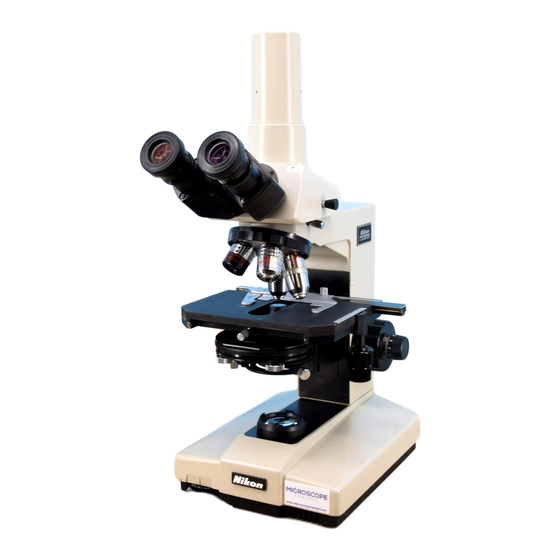Nikon Labophot Gebruiksaanwijzing - Pagina 9
Blader online of download pdf Gebruiksaanwijzing voor {categorie_naam} Nikon Labophot. Nikon Labophot 28 pagina's. Y-r stand biological microscope

• Repeat the above procedure two times, and
a perfect diopter adjustment will be achiev-
ed.
• The above adjustment,
compensating the
diopter difference between the user's right
and left eyes, will keep the tube length of
microscope correct, thus enabling him to
realize the full advantages of the highclass
objectives, including their parfocality.
(4) Since the CF eyepieces are of high eyepoint
type, it is not necessary for the user putting
on his spectacles to remove them.
Only fold down the eyeguard rubber.
(Fig.7)
2.
Manipulation of Each Element
1) Interpupillary distance adjustment
Place a specimen on the stage, and focus on the
specimen. As shown in Fig. 4, adjust the inter-
pupillary
distance, so that both the right and
left viewfields become one.
2) Diopter adjustment
Make diopter adjustment for both the right and
lefthand eyepieces.
(1) Turn the diopter
ring on each eyepiece,
until
the end surface of the milled ring
coincides with the engraved line, as shown
in Fig. 5.
Fig. 6
Fig. 7
Diopter ring
End surface
Engraved line
Fig. 5
(2) Mount the specimen on the stage. Swmg
the objective 40X into position, and bring
the specimen image into focus. For facilitat·
ing the focusing, first use the
lOX
and then
40X objective.
(3) Thereupon,
swing the objective 4X mto
position.
Without manipulating
the coarse and fine
focus knob, turn the diopter rings on the
eyepieces, so that the specimen images in
the right and lefthand eyepieces are focus-
ed individually
9
3) Optical path change-over in the trinocular
eyepiece tube
(1) When using the trinocular
eyepiece tube
As shown in Fig. 8, when the observation
tube is turned toward the user, 100% of
light enters the observation tube.
Observation
tube 100%
Fig. 8
As shown in Fig. 9, when the observation
tube is revolved 60° leftward, 100% of light
enters the vertical photo tube.
In either case, turn the tube to the limit.
